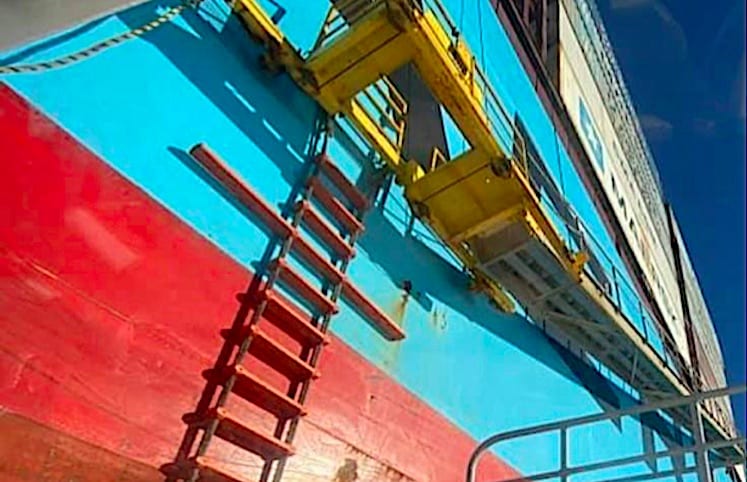Watch: Here’s How Maritime Pilots Board Vessels During Winter in Finland
You know the saying, “when life gives you lemons, make lemonade”. That’s exactly what maritime pilots in Finland do when it’s simply too icy for the pilot boats. The video...


The American Pilots’ Association has sent a letter to state pilotage authorities across the United States on behalf of approximately 1,200 American ship pilots to improve safety following the death of a New York pilot in December.
The letter comes after Captain Dennis Sherwood of the Sandy Hook Pilots Association was killed in a fall while boarding an inbound containership on December 30, 2019. According to preliminary reports, the ladder arrangement used during the accident involved a combination of an accommodation ladder and a pilot ladder, with a “trapdoor” that requires the pilot pull themselves up while also twisting to ensure proper footing on the platform.
According to the APA’s letter, this “trapdoor” is commonly used within the industry despite the known dangers associated and IMO guidelines against it.
“This trapdoor arrangement is currently found on a number of ships with accommodation ladder-pilot ladder combinations, despite the facts that it has long been considered by pilots to be unsafe and that the IMO has recognized that it is unsafe by taking steps to eliminate it,” the APA states in the letter. “Since at least 1979, IMO guidelines have recommended that pilot ladders used with a trapdoor extend to the height of the platform’s handrail. The purpose of that recommended practice is to bring the ladder steps up to a level from which the pilot can step across to the platform rather than pull himself or herself up to it.”
The APA says the issue of unsafe pilot conditions was addressed nine years ago when the International Maritime Organization revised SOLAS pilot transfer regulation (SOLAS V/23) and implementing guidelines (Res. A.1045), found here.
Specifically, Regulation 23 specifies that a pilot ladder “shall be rigged through the trapdoor and extend to the height of the handrail” and, in addition, “means shall be provided to secure the lower platform of the accommodation ladder to the ship’s side, so as to ensure that the lower end of the accommodation ladder and the lower platform are held firmly against the ship’s side.”
Resolution A.1045 similarly provides that when a trapdoor is used in a combination arrangement, “the pilot ladder should extend above the lower platform to the height of the handrail and remain in alignment with and against the ship’s side.”
“Against this background, it is frustrating, and now tragic, that pilots continue to encounter, and have to deal with, trapdoor arrangements like the one found on the ship from which Captain Sherwood fell. BUT, it doesn’t have to be this way. Complying with Regulation 23 and Resolution A.1045 is not an expensive proposition. Replacing or retrofitting equipment to meet the standards would not be a significant project,” the APA’s letter states.
On behalf of the 1,200 ship pilots in the U.S. state pilotage system, the APA is now asking the various pilotage authorities across the country to communicate with their pilots and the maritime community of the dangers associated with the trapdoor arrangement and remind both pilots and crews that that pilot has the right to refuse transfer if a situation is reasonably perceived as unsafe, as well as inform about IMO standards currently in effect.
The American Pilot’s Association full letter can be found here.
Read Next: IMO Urged to Crack Down on Dangerous Ladder Arrangements After Pilot’s Death

Sign up for gCaptain’s newsletter and never miss an update

Subscribe to gCaptain Daily and stay informed with the latest global maritime and offshore news
Essential news coupled with the finest maritime content sourced from across the globe.
Sign Up